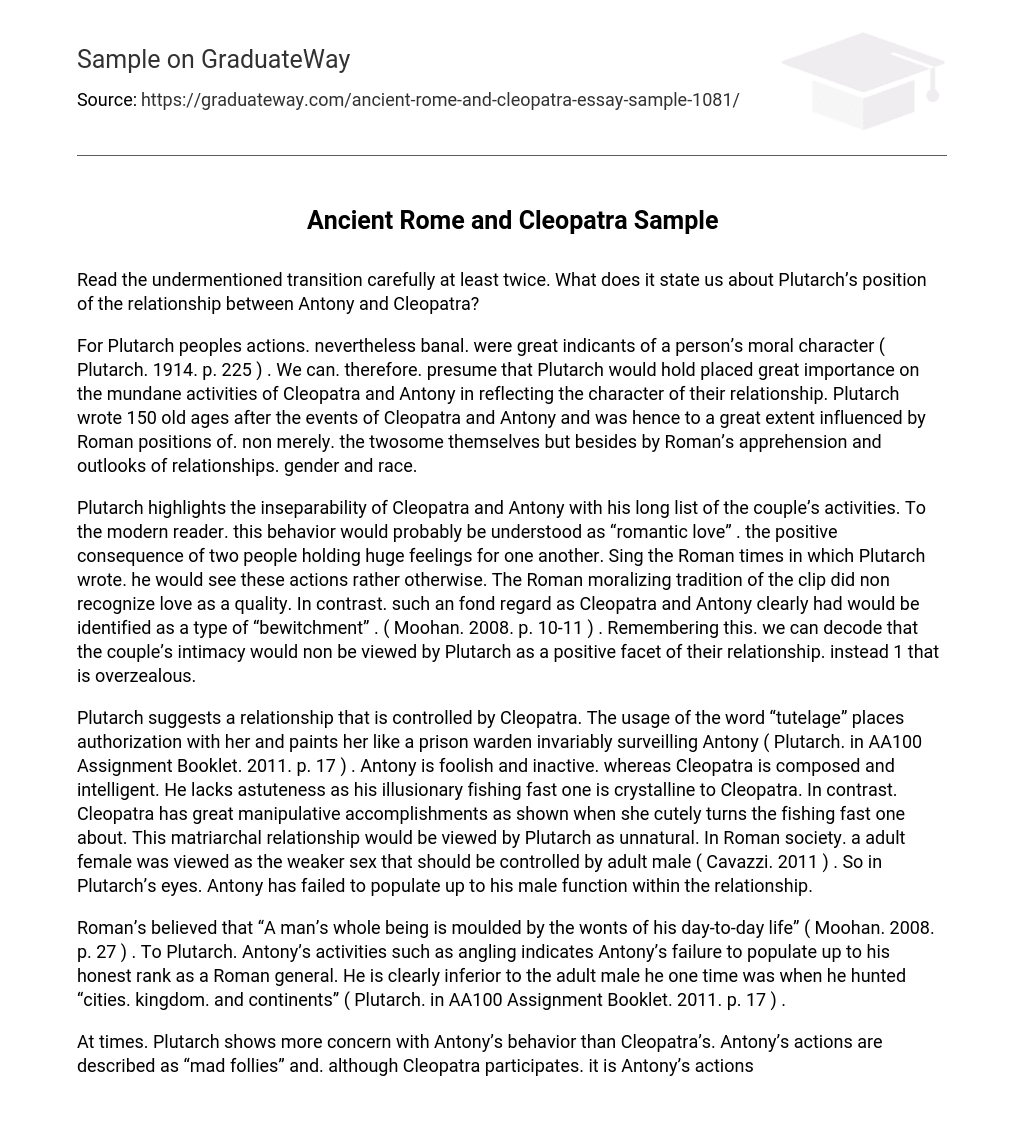Read the following passage carefully at least twice. What does it tell us about Plutarch’s view of the relationship between Antony and Cleopatra?
For Plutarch, people’s actions, however banal, were great indicators of a person’s moral character (Plutarch, 1914, p. 225). We can therefore assume that Plutarch would have placed great importance on the everyday activities of Cleopatra and Antony in reflecting the character of their relationship.
Plutarch wrote 150 years after the events of Cleopatra and Antony and was therefore heavily influenced by Roman views of not only the couple themselves, but also by Romans’ understanding and expectations of relationships, gender, and race.
Plutarch highlights the inseparability of Cleopatra and Antony with his long list of the couple’s activities. To the modern reader, this behavior would probably be understood as “romantic love”, the positive effect of two people having strong feelings for one another. Considering the Roman times in which Plutarch wrote, he would see these actions quite differently.
The Roman moralizing tradition of the time did not recognize love as a quality. In contrast, such an attachment as Cleopatra and Antony clearly had would be identified as a type of “bewitchment” (Moohan, 2008, p. 10-11). Remembering this, we can decode that the couple’s intimacy would not be viewed by Plutarch as a positive aspect of their relationship, rather one that is overly zealous.
Plutarch suggests a relationship that is controlled by Cleopatra. The use of the word “tutelage” places authority with her and paints her as a prison warden constantly monitoring Antony (Plutarch, in AA100 Assignment Booklet, 2011, p. 17). Antony is foolish and inactive, whereas Cleopatra is composed and intelligent. He lacks astuteness, as his illusory fishing trick is transparent to Cleopatra.
In contrast, Cleopatra has great manipulative skills as shown when she cleverly turns the fishing trick around. This matriarchal relationship would be viewed by Plutarch as unnatural. In Roman society, a woman was viewed as the weaker sex that should be controlled by men (Cavazzi, 2011). So in Plutarch’s eyes, Antony has failed to live up to his male role within the relationship.
Romans believed that “A man’s whole being is moulded by the habits of his daily life” (Moohan, 2008, p. 27). To Plutarch, Antony’s activities such as fishing indicate Antony’s failure to live up to his honest rank as a Roman general. He is clearly inferior to the man he once was when he hunted “cities, kingdom, and continents” (Plutarch, in AA100 Assignment Booklet, 2011, p. 17).
At times, Plutarch shows more concern with Antony’s behavior than Cleopatra’s. Antony’s actions are described as “mad follies,” and although Cleopatra participates, it is Antony’s actions that lack ground, not hers (Plutarch, in AA100 Assignment Booklet, 2011, p. 17).
Romans viewed the Egyptian manner of life as inferior and “barbaric” compared to the civility of Roman civilization, as reiterated by many Roman historiographers such as Cassius Dio (Moohan, 2008, p. 27). Therefore, Plutarch is more concerned with Antony’s actions as he expects more from a Roman adult male. As a woman and an Egyptian, Plutarch does not have such high expectations of Cleopatra, which is why he is less focused on her.
This passage underlines the negative influence of the relationship on Antony and highlights the power dynamics of the relationship. Cleopatra is in control and outwits Antony, whereas he is powerless and crazy. Plutarch makes sense of Antony’s behavior with a typical Roman view. He has been bewitched by Cleopatra, and he is the victim because, being of a superior race and gender, he has more to lose than his female Egyptian spouse.
Bibliography
- Plutarch. Life of Antony. 29–30; reprinted in AA100 Assignment Booklet (October 2011). Milton Keynes, The Open University. p. 17.
- Moohan, E. (2008) ‘Plutarch’s Antony: The Fallen Hero’. In Moohan, E. (ed.) Reputations (AA100 Book 1). Milton Keynes, The Open University, pp. 9-12.
- Moohan, E. (2008) ‘Constructing Cleopatra: ‘spin’ at Rome’. In Moohan, E. (ed.) Reputations (AA100 Book 1). Milton Keynes, The Open University, pp. 6-9.
- Moohan, E. (2008) ‘Augustus on Cleopatra’. In Moohan, E. (ed.) Reputations (AA100 Book 1). Milton Keynes, The Open University, pp. 27.
- Plutarch, Goodwin, W. (1874) Plutarch’s Morals. Volume 5. Little, Brown and Company. Harvard University.
- “Translators Introduction” in Plutarch (1914) The Parallel Lives published in Vol. VII of the Loeb Classical Library edition. Available from http://penelope.uchicago.edu/Thayer/E/Roman/Texts/Plutarch/Lives/Introduction*.html (Accessed 25 October 2011).
- Cavazzi, F. Roman Society. Roman Life. Available from http://www.roman-empire.net/society/society.html (Accessed 1 December 2011).





